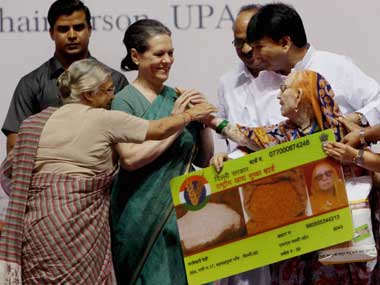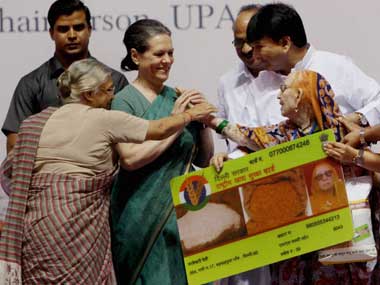“It is a welcome first step,” said Right to Food campaign’s Kavita Srivastava on Delhi’s launch of the Food Security scheme today. While Right to Food campaign has been critical of the Food Security Bill, that is pending before Parliament, for falling far short of providing food security in its true sense, it has welcomed Delhi’s expansion of the public distribution system through its implementation of the food security scheme. “More people are going to be covered under the Public Distribution System (PDS) and that is definitely a welcome step. It shows that we are not writing off the PDS. It is a welcome first step. Yes, it is far from nutrition or food security. What it is, is an expansion of coverage of the PDS, which is an important issue," she said. “In that sense, it is a welcome development, especially given what was proposed last year. Delhi had moved towards cash transfer with its Annashree scheme, which never even took off. Now they have revised their position to distribution through ration shops and that is welcome,” said Srivastava. [caption id=“attachment_1047625” align=“alignleft” width=“380”]
 Sonia Gandhi launched the food security scheme in Delhi today. PTI[/caption] So will the food security bill limit the role of states from expanding the scope of food security? Social activist Nikhil Dey, who has been associated with the Right to food campaign said, “The provisions (of the legislation) make it clear that states will have flexibility. One hopes that what Chhattisgarh has achieved most other states will achieve or surpass.” Dey said he didn’t think the new law would affect existing state laws such as the Chhattisgarh Nutrition and Food Security Act, which is considered to be far better than national scheme. “I don’t think it will and if it does that is something that can be ironed out. All of us are very much in favour of flexibility. Chhattisgarh food security Act is certainly an improvement. And it will be much easier for Chhattisgarh to implement it,” he said. Srivastava also agrees that the food security bill allows flexibility to states on implementation. “While the legislation does not limit states what is not clear is the level of central assistance to the states in implement the scheme. The commitment of central assist to states should be clearly spelt out. It should be at least up to 50 per cent, " she said. Asked about the key amendments the campaign would like to see before the bill is passed, Srivastava said, “The bill has been very unfair to the destitutes. They have been completely left out, there is no mention of community kitchens. That provision should be restored.” “The bill, through Schedule II, note 1 and 2, is opening doors to contractors. That should be completely scrapped. A crucial issue is that of the minimum entitlement of 5 kg is too little. We have proposed 14 kg for an adult and 10 kg for a child. Ten kg person per household should be the minimum entitlement,” she said. Bringing up the bill’s poor grievance redressal mechanism, Dey said, “To have a stronger grievance redressal mechanism does not require more money, it only requires a stronger accountability mechanism. Secondly, it would have been very good if there was least at facilitation of items such as oil and pulses, particularly for the Antyodaya-level of family.” “The Antyodaya selection in the country has, by and large, not been bad. These are families who need more than food grain, they need nutrition. They really need a larger package,” he said.
Sonia Gandhi launched the food security scheme in Delhi today. PTI[/caption] So will the food security bill limit the role of states from expanding the scope of food security? Social activist Nikhil Dey, who has been associated with the Right to food campaign said, “The provisions (of the legislation) make it clear that states will have flexibility. One hopes that what Chhattisgarh has achieved most other states will achieve or surpass.” Dey said he didn’t think the new law would affect existing state laws such as the Chhattisgarh Nutrition and Food Security Act, which is considered to be far better than national scheme. “I don’t think it will and if it does that is something that can be ironed out. All of us are very much in favour of flexibility. Chhattisgarh food security Act is certainly an improvement. And it will be much easier for Chhattisgarh to implement it,” he said. Srivastava also agrees that the food security bill allows flexibility to states on implementation. “While the legislation does not limit states what is not clear is the level of central assistance to the states in implement the scheme. The commitment of central assist to states should be clearly spelt out. It should be at least up to 50 per cent, " she said. Asked about the key amendments the campaign would like to see before the bill is passed, Srivastava said, “The bill has been very unfair to the destitutes. They have been completely left out, there is no mention of community kitchens. That provision should be restored.” “The bill, through Schedule II, note 1 and 2, is opening doors to contractors. That should be completely scrapped. A crucial issue is that of the minimum entitlement of 5 kg is too little. We have proposed 14 kg for an adult and 10 kg for a child. Ten kg person per household should be the minimum entitlement,” she said. Bringing up the bill’s poor grievance redressal mechanism, Dey said, “To have a stronger grievance redressal mechanism does not require more money, it only requires a stronger accountability mechanism. Secondly, it would have been very good if there was least at facilitation of items such as oil and pulses, particularly for the Antyodaya-level of family.” “The Antyodaya selection in the country has, by and large, not been bad. These are families who need more than food grain, they need nutrition. They really need a larger package,” he said.
Welcome Food Security scheme, but just a first step, say activists
Pallavi Polanki
• August 21, 2013, 07:20:22 IST
Activists who were part of the Right to Food campaign say that the existing bill has many problems that need to be ironed out.
Advertisement
)
End of Article